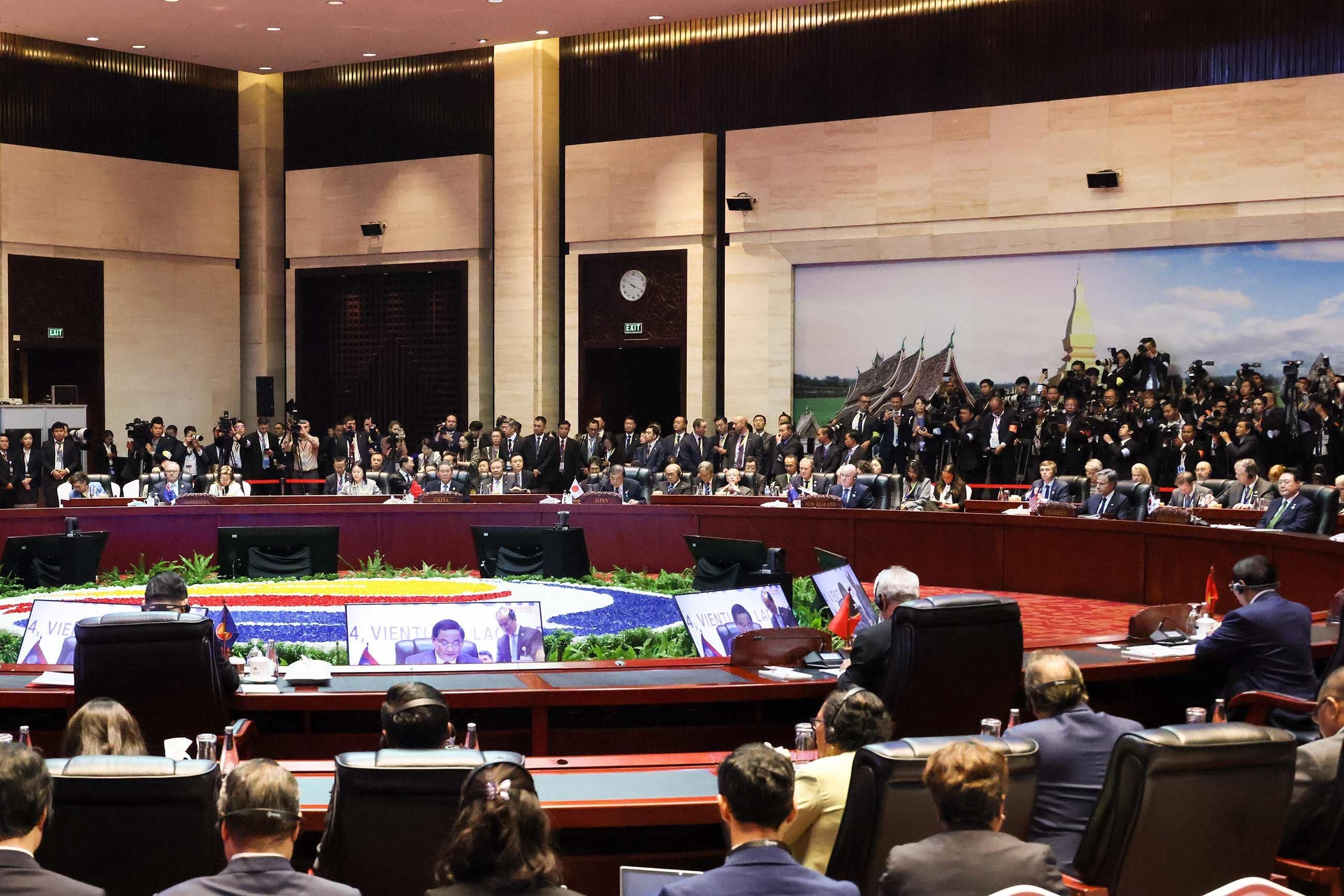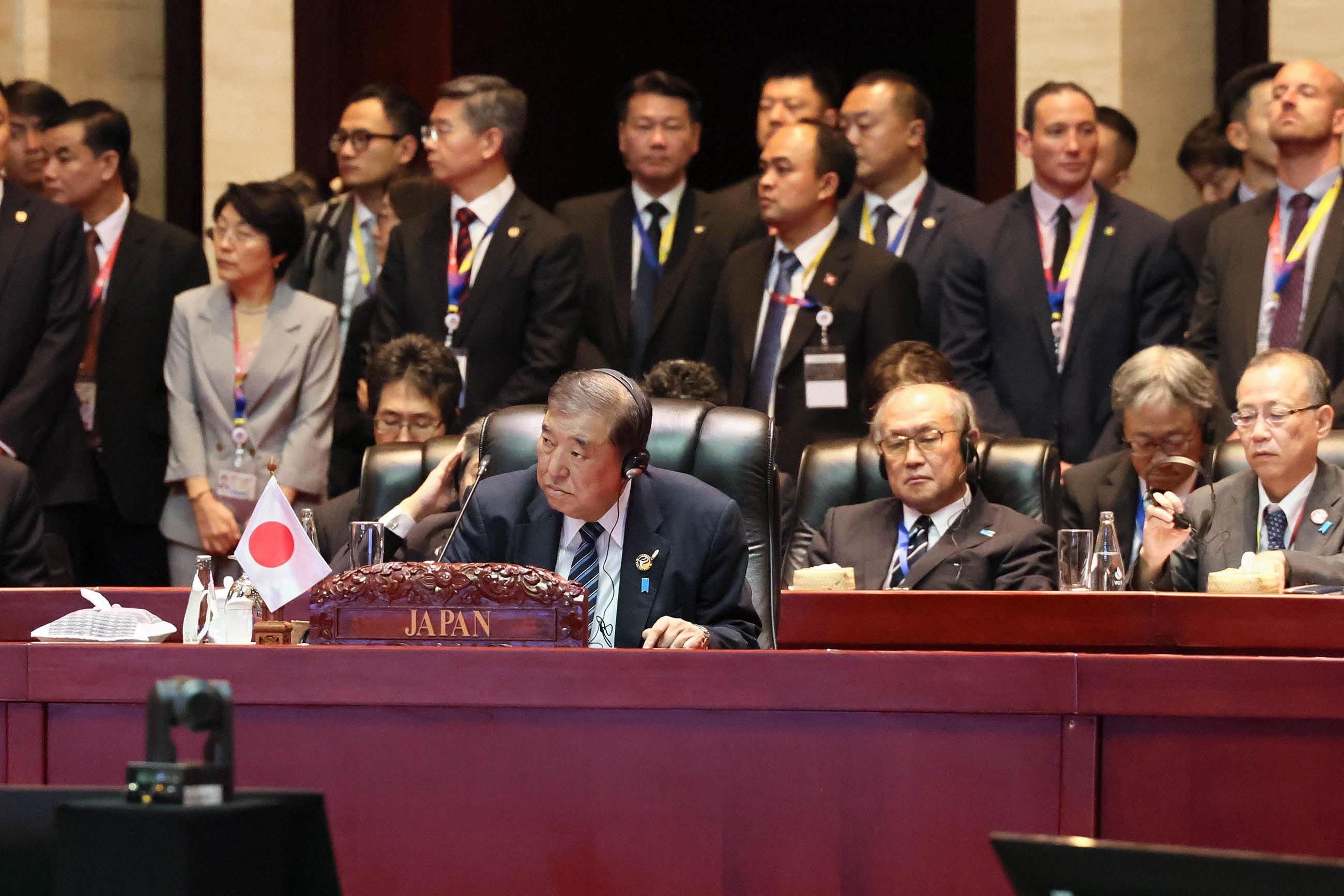The 19th East Asia Summit (EAS) (Summary)
October 11, 2024
[Provisional translation]
On October 11, commencing at 10:10 a.m. local time (0:10 p.m. JST) for approximately 150 minutes, the 19th East Asia Summit (EAS) was held in Vientiane, Lao PDR. Mr. ISHIBA Shigeru, Prime Minister of Japan, attended the meeting. The overview of the meeting is as follows.
1. General Remarks and Regional Cooperation
Prime Minister Ishiba’s statement is outlined as follows:
- The principles of the UN Charter, such as respect for sovereignty and territorial integrity, peaceful settlement of disputes based on international law, and prohibition of the use of force, are becoming increasingly important in today’s turbulent international situation.
- We must not tolerate any unilateral attempts to change the status quo by force or coercion anywhere in the world. To lead the region toward cooperation rather than division or confrontation, it is essential to maintain and strengthen a free and open international order based on the rule of law.
- Japan supports ASEAN centrality and unity. We also consistently advocate ASEAN Outlook on the Indo Pacific (AOIP) and will continue to actively support promotion and mainstreaming of the initiative.
- Japan is promoting concrete cooperation in the Indo-Pacific region, in collaboration with EAS participating countries such as Australia, India and the United States.
- Japan will enhance cooperation through ASEAN-led frameworks including EAS to maintain and strengthen a free and open international order based on the rule of law.
2. North Korea
(1) The Prime Minister Ishiba delivered remarks outlined as follows:
- Japan is seriously concerned about the advancement of North Korea’s nuclear and missile activities in violation of United Nations Security Council resolutions, as well as military cooperation with Russia.
- Peace and stability of the Korean Peninsula are in our common interest. In order to uphold the international non-proliferation regime, a robust response of the international community toward the complete denuclearization of North Korea is critical.
- Japan calls for the continued understanding and cooperation from EAS participating countries toward the immediate resolution of the abductions issue.
(2) Other participating countries also expressed concerns over North Korea’s provocative activities and military cooperation with Russia, emphasized the importance of the denuclearization of the Korean Peninsula and the full implementation of the relevant United Nations Security Council Resolutions, and expressed concerns on the human rights situation including the abductions issue.
3. East and South China Seas, Taiwan, etc.
(1) The Prime Minister Ishiba gave statement outlined as follows:
- Japan strongly opposes continuing and intensifying activities that infringe upon Japan’s sovereignty and provocative military activities in the East China Sea. Japan is also seriously concerned about militarization and coercive activities that are continuing and intensifying in the South China Sea.
- Any unjust claims of maritime interests and activities that do not align with the United Nations Convention on the Law of the Sea are unacceptable. Japan consistently upholds rule of law at sea. Japan strongly hopes that the parties’ compliance with the Arbitral Tribunal’s award will lead to the peaceful settlement of disputes.
- Peace and stability across the Taiwan Strait are also important for the region and the international community. There is no change in Japan’s basic positions on Taiwan.
- Japan and China bear great responsibilities for the peace and prosperity of the international community including the Southeast Asian region. Japan will continue to maintain close communication with China at all levels.
(2) Other participating counties expressed concerns over the situation in the East and South China Seas, emphasized the importance of the freedom of navigation and overflight, of the peaceful resolution of disputes in accordance with international law, and of the peace and stability across the Taiwan Strait, and expressed concerns over the increasing tensions.
4. Situation in Myanmar
(1) Prime Minister Ishiba expressed serious concern over the situation in Myanmar and called for the improvement in the situation. He also stated Japan will continue to offer maximum support to ASEAN’s efforts including the implementation of the “Five-Point Consensus” and provide humanitarian assistance.
(2) Other participating counties also expressed serious concerns over the situation in Myanmar and emphasized the importance of implementation of “the Five-Point Consensus” and addressing humanitarian situation.
5. Russia’s aggression against Ukraine
(1) Prime Minister Ishiba pointed out that ongoing Russia’s aggression against Ukraine is a blatant breach of international law, and emphasized that we must realize a just and lasting peace as soon as possible. He also stated Japan will continue to support Ukraine and impose sanctions against Russia.
(2) Other participating countries also made remarks condemning Russia’s aggression against Ukraine.
6. Situation in the Middle East
(1) Prime Minister Ishiba stated it is clear that the escalation of the situation in the Middle East is extremely dangerous for the region and international community as a whole, and called for a united response in urging all parties concerned to exercise the utmost restraint. He also stated that Japan would like to work together to improve the humanitarian situation in Gaza as an urgent issue.
(2) Other participating countries expressed concerns on the situation in the Middle East and humanitarian situation.

